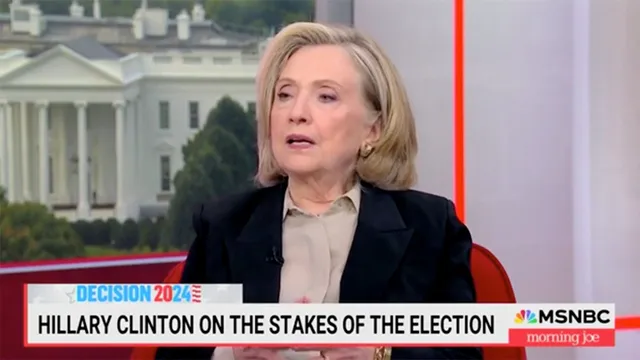
Clinton backs Harris for popular vote win over Trump in November
2024-09-19 11:43- Hillary Clinton predicted that Kamala Harris and Tim Walz will win the popular vote in the upcoming election.
- Clinton emphasized the importance of winning the Electoral College, noting the challenges female candidates face in gaining voter support.
- She concluded that focusing on the differences between Harris and Trump could lead to electoral success.
Express your sentiment!
Insights
Hillary Clinton expressed strong confidence in an interview on MSNBC's 'Morning Joe' that Vice President Kamala Harris and her running mate, Gov. Tim Walz, will secure the popular vote in the upcoming election. She referenced her own experience in the 2016 election, emphasizing the importance of winning the Electoral College, which requires 270 electoral votes. Clinton highlighted the ongoing challenges female candidates face, particularly the double standards in how their policies are scrutinized compared to their male counterparts. Clinton defended Harris against criticisms regarding her policy positions, asserting that Harris has presented substantial governance promises. She noted that the perception of female candidates often influences voter decisions, suggesting that some voters may still be hesitant to support a woman for the presidency. Clinton's remarks reflect her belief that the Harris campaign is aware of these dynamics and is prepared to address them. In her critique of Donald Trump, Clinton framed the election as a pivotal moment for democracy, contrasting it with autocracy. She urged the media to focus on the broader implications of the election, rather than just the competitive aspects. Clinton's comments underscore the stakes involved, emphasizing the need for voters to understand the fundamental choices they face in the election. Ultimately, Clinton encouraged Harris to concentrate on the clear distinctions between her vision for the country and Trump's, asserting that this approach could lead to electoral success. Her insights reveal a strategic perspective on how to navigate the complexities of the current political landscape.
Contexts
In the lead-up to the November elections, Vice President Kamala Harris has gained a surprising lead over former President Donald Trump, with recent national polling averages showing her ahead by 3 percentage points. This shift follows President Biden's endorsement of Harris after his campaign suspension, which has altered the dynamics of the race. Trump's remarks on Harris's lead indicate his concern over her growing popularity, particularly among key voter demographics. Harris is actively engaging with specific voter groups, including Latter-day Saints in Arizona, to secure their support. This outreach is crucial given the narrow margins in recent elections and the potential impact of these voters on the overall outcome. Additionally, a coalition of evangelicals has formed to support Harris, presenting her as an alternative to Trump, which may further influence swing state dynamics. Despite her lead, Harris faces challenges, including criticism from the 'Uncommitted' movement in Michigan, which has refused to endorse her due to concerns over her policies related to the Israel-Hamas conflict. This dissent highlights the complexities within the Democratic base as the election approaches. Furthermore, disinformation campaigns targeting Harris have intensified, aiming to undermine her credibility and sway public opinion. These tactics underscore the contentious nature of the upcoming election and the importance of maintaining voter trust in the electoral process.